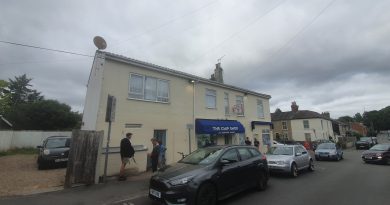Norwich – William Rudling (the thieving butcher)
I’d add firstly that this isn’t some angry blog post about being short changed on a sausage roll, this is a story from the Norfolk Chronicle that was published 150 years ago today, in late February 1871.
The newspaper noted that William Rudling was a butcher on Ber Street and he had rigged his scales to short-change customers. Samuel Sutton, the Inspector of Weights and Measures, had visited his shop and noticed that a piece of iron wire had been attached to the scales which found half an ounce against the purchaser. A second test was performed and the scales were still out, although now they were an ounce out.
The case was heard at the Guildhall in the city and William decided that he wouldn’t turn up and instead he sent his wife Charlotte to deal with the matter. I can imagine she was really pleased with this little arrangement, although she then didn’t say anything in court, so that might not have gone to plan. With that lack of defence, William was fined £1 (something like £60 in today’s money) and was also ordered to pay costs of just over £1.
At the 1871 census (which took place shortly after this, at the beginning of April 1871) William Rudling lived above his shop on Ber Street with his wife Charlotte, and his children, Charlotte, Elizabeth, Esther, Thomas and Emma, along with their grand-child Alice. At this time, both William and his wife were aged 53.
Going back ten years to the 1861 census, the family lived at the same property on Ber Street, with the children William, Henry, Emma, Charlotte, Elizabeth, Esther, Alice and Thomas living with them, along with a servant, Sophia Poll. At this 1861 census William was listed as being a carpenter and builder, so his butchery skills were perhaps acquired after that, and he had also been listed in the 1851 census as living as Ber Street and working as a carpenter. As an aside, the younger William Rudling had taken up an apprenticeship as a stone mason which he ran off from on 12 April 1865. At the magistrates court it was decided that the matter would be dropped as the young William said that he would return to complete his apprenticeship.
At the 1881 census, the household was rather quieter, it was just William and Charlotte, along with an Elizabeth Osborne who was listed as a companion. The husband and wife were now living at 4 Horns Lane in the city, with William being described as a carpenter again. Horns Lane is still a street in Norwich and it’s located off of Ber Street, so William didn’t really move very far in his lifetime. The property has gone though, the area was flattened by the council and the area is mostly now a car park.
WIlliam died on 26 October 1890, and he died at the age of 73 having been born in 1817. His death was reported in the local paper, the Eastern Daily Press, and he was now living at 10 Horns Lane.
Unfortunately, none of the trade directories tell me exactly where on Ber Street that William had his shop, but what I’m interested in is why he suddenly became a butcher. I’m guessing that he wasn’t perhaps doing very well, which is why he was sent to court for defrauding customers. There was in the 1860s a large increase in the demand for meat, with more people entering the butchery trade, so perhaps William was tempted by the financial rewards. I can’t imagine that some of the locals were too impressed after the court case, that might be the reason that William returned to carpentry.
And would this sort of behaviour happen today? Indeed it would, as just two days ago there was a butcher in Willenhall, the Muddy Pig Butchers, where it was found that coins had been attached to the scales to short change customers by 40g. That’s about 1.4 ounces, so only marginally more than William defrauded his customers. This butcher in Willenhall was treated more severely than William though, he was ordered to pay costs totalling £1,798 and given an 18-month community order of 200 hours of unpaid work..
Nothing ever really changes….





